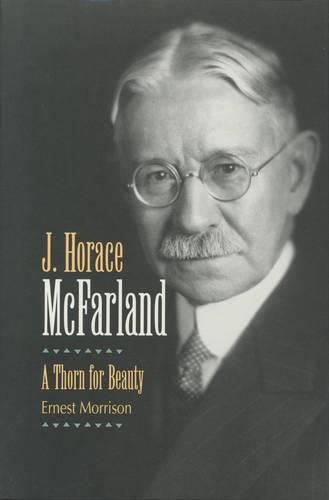Readings Newsletter
Become a Readings Member to make your shopping experience even easier.
Sign in or sign up for free!
You’re not far away from qualifying for FREE standard shipping within Australia
You’ve qualified for FREE standard shipping within Australia
The cart is loading…






J. Horace McFarland (1859-1948) was one of the first Americans to sound the call for environmental and scenic protection. He helped defend Niagara Falls from power company interests, fought together with John Muir and others to preserve the Hetch Hetchy Valley at Yosemite, and after that defeat rose again to be hailed as the father of the National Park Service. Esteemed by Presidents Theodore Roosevelt and William H. Taft, McFarland advised secretaries of the interior for a period spanning forty years. A lifelong resident of Harrisburg, Pennsylvania, he played a key role in developing a reform package calling for the cleanup of the city and its river, and the creation of a splendid municipal park system. A noted writer, photographer, and astute businessman who owned a successful printing company, he was also an acclaimed gardener and the preeminent rosarian in America.
It is within the Progressive Era-an age identified by its crusading spirit of cleaning up politics and municipal environments, and assuring the proper use of natural resources-that McFarland’s story unfolds. As Ernest Morrison compellingly reveals, McFarland’s greatness lay in the form of his unique skills in campaign planning and consensus building, and, at his core, in a profound integrity. Morrison’s scholarship and enthusiasm for his subject combine to create a vivid account of one whose crucial role in early conservation and environmental history has until now been almost forgotten. The photographs beautifully depict an era whose hallmark was public service.
$9.00 standard shipping within Australia
FREE standard shipping within Australia for orders over $100.00
Express & International shipping calculated at checkout
J. Horace McFarland (1859-1948) was one of the first Americans to sound the call for environmental and scenic protection. He helped defend Niagara Falls from power company interests, fought together with John Muir and others to preserve the Hetch Hetchy Valley at Yosemite, and after that defeat rose again to be hailed as the father of the National Park Service. Esteemed by Presidents Theodore Roosevelt and William H. Taft, McFarland advised secretaries of the interior for a period spanning forty years. A lifelong resident of Harrisburg, Pennsylvania, he played a key role in developing a reform package calling for the cleanup of the city and its river, and the creation of a splendid municipal park system. A noted writer, photographer, and astute businessman who owned a successful printing company, he was also an acclaimed gardener and the preeminent rosarian in America.
It is within the Progressive Era-an age identified by its crusading spirit of cleaning up politics and municipal environments, and assuring the proper use of natural resources-that McFarland’s story unfolds. As Ernest Morrison compellingly reveals, McFarland’s greatness lay in the form of his unique skills in campaign planning and consensus building, and, at his core, in a profound integrity. Morrison’s scholarship and enthusiasm for his subject combine to create a vivid account of one whose crucial role in early conservation and environmental history has until now been almost forgotten. The photographs beautifully depict an era whose hallmark was public service.